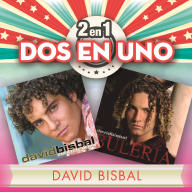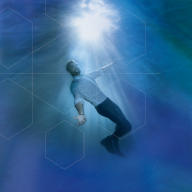David Bisbal Ferre was born on June 5, 1979, in Almería, Spain. His father, José Bisbal, was at once a professional boxer and amateur flamenco musician. He attended the secondary school IES Al-Andalus in Almería, but dropped out at 15. His father put him to work as a day laborer in a local nursery, but the younger Bisbal was undaunted. Music had been his passion from the time he could speak. He had written songs as early as ten, and though initially shy, he overcame it to work live with local musicians in a variety of settings. In 1997 he met the producer of the Orchestra Expressions, who had heard him singing with a local band. The producer was so impressed, he offered Bisbal the role of lead singer for the orchestra.
He developed quickly as a vocalist. After three years with Orchestra Expressions, Bisbal traveled to Barcelona in 2001 to audition for the inaugural season of the reality music competition series Operación Triunfo. Of the 16 contestants, he was a runner-up to winner Rosa Lopez. The top three contestants all qualified for a second phase of competition: The prize was the opportunity to represent Spain in the Eurovision Song Contest. He placed second to López, then attended the competition in Tallin, Estonia, and accompanied her as a backing vocalist. Despite finishing second, Operacion Triunfo made Bisbal a television star. After signing to the Universal-affiliated Vale Music label, he released his full-length solo album debut in 2002 with Corazón Latino. Produced and largely written by Latin pop hitmaker Kike Santander (whose previous credits included smash hits by Gloria Estefan and Alejandro Fernández, among others), Corazón Latino not only topped the Spanish albums chart; it sold over two million copies globally due to a trio of chart-topping singles ("Ave María," "Lloraré las Penas," "Dígale"). Moreover, the album was a moderate success in the United States, where "Lloraré las Penas" proved particularly popular. Amid the many awards for which he was nominated in the wake of his recording debut, Bisbal won a Latin Grammy in 2003 for Best New Artist.
The follow-up album, Bulería (2004), rivaled the success of Corazón Latino, topping the Spanish albums chart and spawning a series of chart-topping singles ("Bulería," "Oye el Boom," "Camina y Ven," "Cómo Olvidar"). Produced and largely written again by Santander, Bulería found Bisbal indulging in a wider range of musical styles than before, flamenco in particular. A live album, Todo por Ustedes (2005), and a greatest-hits compilation, David Bisbal (2006), were released prior to Bisbal's third studio effort, Premonición (2006). Helmed as usual by Santander and more rock-inclined than prior albums, Premonición was another chart-topper for Bisbal, as were the featured singles "Quien Me Iba a Decir," "Silencio," and "Torre de Babel." In 2007, the album was repackaged as Premonición Live, a deluxe edition featuring "Hate That I Love You" (Odio Que Te Amo), a bilingual version of Rihanna's international hit of the same name.
Sin Mirar Atras arrived in 2009 and saw Bisbal credited with much of the songwriting which, for the first time, didn't include Kike Santander. This change didn't seem to affect the outcome, however, as Sin Mirar Atrás swept the Spanish charts, while a deluxe edition of the record included "Sufrirás," a duet with English singer Pixie Lott. In 2011, Bisbal released his third live album, Acústico: Una Noche en el Teatro Real; another concert recording followed in 2013, titled Live at the Royal Albert Hall. Bisbal began recording for his fifth studio album in 2013. The results were finally released in March 2014 with the title Tú y Yo. The album spent five weeks at number one in Spain and sold well across Europe; the single "Diez Mil Maneras" also hit the top of the singles charts in Spain.
In 2016, Bisbal's frequent charitable work merged with his recording career in the form of Hijos del Mar, an album whose first single "Antes Que No" dealt with the child refugee crisis; all of his proceeds on the single went to UNICEF in Spain. The set once more topped the Spanish charts and was certified platinum. It peaked at four on the Latin Albums chart in the U.S. and topped several streaming charts. Bisbal spent the next three years touring and working for charitable causes while releasing a stopgap series of singles, compilations, and videos. The singles included "Perdon," with Greeicy, and "Si Tú La Quieres," with Aitana. In early 2020, Bisbal released the 17-track full-length En Tus Planes. In addition to the aforementioned singles, he released duets with Sebastián Yatra ("A Partir de Hoy"), Alejandro Fernandez ("Abriré La Puerta"), Juan Magan ("Bésame”), and the bilingual "Tears of Gold" with Carrie Underwood. The long-player topped the streaming charts and was certified platinum in Spain. ~ Jason Birchmeier & Thom Jurek, Rovi


















